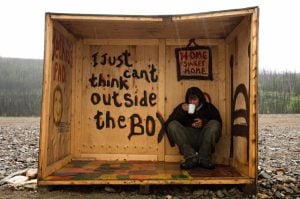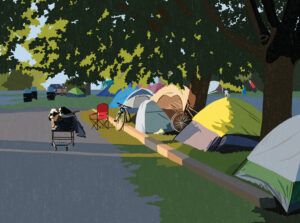
People & Culture
Kahkiihtwaam ee-pee-kiiweehtataahk: Bringing it back home again
The story of how a critically endangered Indigenous language can be saved
- 6310 words
- 26 minutes
This article is over 5 years old and may contain outdated information.
People & Culture

The experts are making me sick!
We’ve all heard their dire warnings. Some studies warn that we have to work out vigorously for at least half an hour a day for three days a week to avoid serious health troubles. Other studies take a much more relaxed view.
These pronouncements by health experts do little more than make people feel guilty, stressed and discouraged. The result: we exercise even less.
You’d think healthy living is only attainable for Olympic champions. At least that’s the impression I get. Yet the statistics suggest something else. The athletic fanatics are not outliving the rest of us by decades. In fact, sometimes they’re leading the pack as they drop on the sidewalk.
Remember Dr. Thaddeus Kostrubala? He authored the runaway bestselling book called The Joy of Running. It transformed a generation of couch potatoes into running fanatics. (Even I started jogging in the 1970s because of the worldwide running craze.) But he died in his early 50s. What was the cause of death? Heart attack. He pounded the pavement, completing scores of marathons. Did over-exercise kill him? Possibly.
But there’s more to this story. Did you know that few Olympic athletes live much beyond “average” life spans? In fact, many die long before the average. Perhaps too much exercise is as bad as too little.
Here’s a story I like: some years ago British medical officials noticed that double-decker bus drivers died at a much higher rate from heart attacks than did ticket takers riding in their buses. Neither group exercised much. The only difference appeared to be their on-the-job responsibilities. The bus drivers sat all day guiding buses through busy London traffic, while the ticket takers strolled up and down the aisles — sometimes at a snail’s pace. Occasionally, the ticket takers climbed up to the second story to collect a fare or help someone. That was the only difference between their lifestyles. Yet the ticket takers generally lived many years longer, free of heart disease.
So I ask: what does this suggest?
Confucius once said, “A journey of a thousand miles begins with the first step.” In my opinion that’s pretty wise advice for anyone wanting to improve fitness levels.
Exercise is not rocket science, and neither is a healthy lifestyle. People have been keeping fit for millennia without resorting to advanced data research and computer modeling.
Like compound interest, all your and my little steps add up quickly over weeks and months. We don’t need to become Jedi Masters overnight. A slow, steady fitness routine will keep interest levels high over many years. For me it’s all about reasonable balance and lifestyle.
Okay. Full disclosure. I’ve been training for a 1,500-km solo canoe trip into Canada’s Arctic this summer. After building up over seven years, I now climb 5,000 flights of stairs a year, cycle 500 km a year and work out at the gym a couple times a week. Everything I do is done at a slow, relaxed pace.
The Royal Canadian Geographical Society is sponsoring Allen Macartney’s solo canoe trip down the Yukon River this summer, retracing the Klondike Gold Rush Route. Visit his website at www.yukonsummer.com
Are you passionate about Canadian geography?
You can support Canadian Geographic in 3 ways:

People & Culture
The story of how a critically endangered Indigenous language can be saved

Travel
An insider’s account of the modern-day gold rush

Places
In Banff National Park, Alberta, as in protected areas across the country, managers find it difficult to balance the desire of people to experience wilderness with an imperative to conserve it

People & Culture
For unhoused residents and those who help them, the pandemic was another wave in a rising tide of challenges